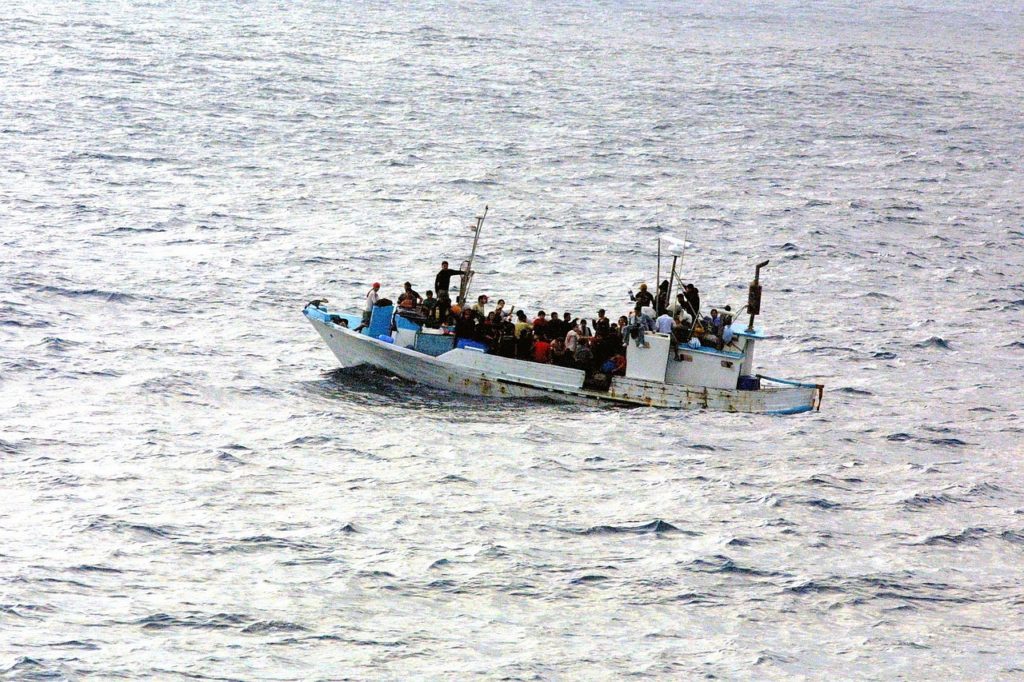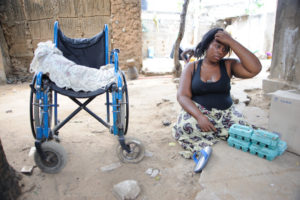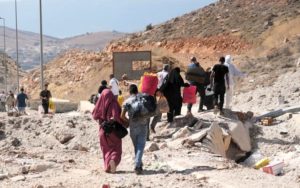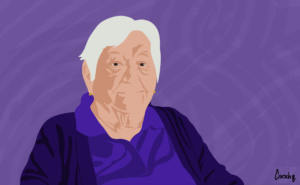In 2021, more than 28,000 asylum seekers crossed the Channel from France to the UK, while in 2022, that number jumped to over 40,000. Most of them travelled in small, overcrowded and unseaworthy boats arranged by people smugglers. Sadly, some of them did not survive the dangerous crossing.
Why, as many British politician and media commentators have asked, do they undertake this life-threatening and expensive journey to the UK, rather than remaining in France, an apparently safe country with a functioning asylum system?

A misleading question
First of all, that question is a somewhat misleading one. According to the UK’s Home Office, France receives a much larger number of asylum seekers than Britain – around 113,000 in the year ending March 2022, compared to some 67,000 in the UK Those who arrive in France are to be found scattered across many different parts of the country, with many of them choosing to remain there. A relatively small proportion of the asylum seekers in France have congregated in locations on the country’s northern coast with the intention of moving on to the UK.
While the cross-Channel movement of asylum seekers has certainly increased in scale in recent times, it is by no means a new phenomenon. For many years, they congregated in the port city of Calais, close to the sea and rail connections with the UK. They lived in squalid informal settlements such as ‘The Jungle’, without access to clean water or basic hygiene facilities, and depending largely on food assistance provided by local associations and solidarity organizations.
While those camps were dismantled by the authorities in 2016, asylum seekers have continued to make their way to the area, living hand-to-mouth in increasingly precarious circumstances. Since that time, UK government funding has been used to barricade the port area in Calais, making it extremely difficult for asylum seekers to stow away on trucks and lorries and to enter the UK in a clandestine manner. As a result, those wishing to cross the Channel have been forced into the hands of people smugglers with small boats at their disposal – a far more visible form of arrival in Britain, which can also be more easily recorded by the authorities.
Conditions in France
Even so, there are a number of reasons why a growing number of the asylum seekers arriving and living in France might want to continue their journey. France’s asylum procedures and reception arrangements provide one explanation. Only 25 per cent of asylum applications in France receive positive decisions, 10 points lower than the average acceptance rate in the European Union as a whole, and significantly less than the 70 per cent of cases accepted in the UK.
Asylum applications in France usually take around nine months to process, and before asylum seekers can even apply for refugee status, they have to register a fixed address with the local authorities. Without such an address they are not allowed to work, take French classes or benefit from the French health system.
According to French law, registered asylum seekers have the right to accommodation in reception centres while their applications are being considered. In practice, however, barely a third of asylum seekers are able to access such shelters due to their limited capacity. France has responded to this situation by endeavouring to provide asylum seekers with emergency accommodation in the winter, while leaving asylum seekers to find their own housing arrangements in the summer months.
Another consideration prompting asylum seekers to move across the Channel is the increasingly hostile reception they have received in recent years from the French state and society. With the continued rise of the far right in France, the government has taken to portraying and treating asylum seekers in a very negative manner. Increasingly, they have become victims of traumatic experiences at the hands of the French police, often involving physical violence and the use of pepper sprays and tear gas. The tents and rudimentary shelters erected by the asylum seekers are routinely destroyed and their meagre possessions confiscated.
Such worsening conditions have provided a ready market for the services of unscrupulous people smugglers, who provide asylum seekers with false information and who encourage them – at a high price – to risk the dangerous cross-Channel journey. Indeed, studies have shown that many of the asylum seekers have a very limited knowledge of the UK before embarking on the small boats that will take them there.
UK connections
For others, however, the UK has a number of specific attractions. Some of the asylum seekers who have congregated on the French coast have family members who have already moved to Britain, and who can assist them once they have landed there. Even those asylum seekers who lack close relatives or good friends in the UK can travel to the country in the knowledge that they will be able to rely on some support from the very large diaspora and ethnic minority communities that are to be found in London and other large British cities.
Cultural and historical factors also play an important part in the decision of some asylum seekers to leave France and to move to the UK. They may speak good English while having no or a much more limited knowledge of French. They often come from countries that were previously British colonies or under the UK sphere of influence. Such connections make it much easier for asylum seekers to communicate with the authorities, to navigate the asylum procedure and settlement process, to access educational opportunities and to find work once they arrive in Britain.
With respect to employment, the nature of the British labour market acts as a further incentive for asylum seekers who are living a precarious life in France. Due to a comparative absence of government regulation, the UK’s ‘shadow economy’ is much larger than that which exists on the other side of the Channel.
And while asylum seekers in Britain are excluded from the official labour market until their claims have been recognized, they can often find poorly paid and menial work in the informal sector: picking crops, working in take-away food outlets or cleaning cars, for example. Needless to say, such work is often exploitative in nature. But it enables asylum seekers to supplement the meagre benefits they receive from the British government.
According to many conservative politicians and media commentators in the UK, those benefits are themselves a major ‘pull factor’ in the movement of asylum seekers across the Channel. Britain, they claim, is a ‘soft touch’ in terms of the assistance provided to refugee claimants, and the growth in the number of people making that journey is a result of the country’s misguided generosity to them.
Such allegations are difficult to sustain. In the last decade, the UK government has deliberately set out to create what it calls a ‘hostile environment’ for asylum seekers and other irregular migrants. They are eligible to receive less than £38 a week in benefits while waiting for a decision on their case, a derisory amount by any standards, especially in a country with a more serious cost-of-living crisis than its European neighbours. According to UNHCR, moreover, they would receive roughly the same amount or even a little more if they were to stay in France, undermining the argument that asylum seekers are lured to the UK by the country’s benefit levels.
British politicians and the media have also made much of the fact that large numbers of asylum seekers in the UK are currently housed in hotels ‘at the expense of the taxpayer’, suggesting that they cross the Channel with the specific objective of accessing such supposedly luxurious accommodation. But in reality, there is nothing luxurious about these hotels. They are often overcrowded, lack maintenance, provide sub-standard food supplied by external contractors, and are increasingly the scene of intimidatory demonstrations by far right and fascist organizations.
The legality of onward movement
While there are several good reasons why a small but growing proportion of the asylum seekers who reach France might choose to move on to the UK, do they have the right to do so? The British government claims that they do not and argues that asylum seekers have an obligation to submit their application for refugee status in the first safe country that they reach.
But this argument is flawed. The notion of ‘first safe country’ is not to be found in international refugee law, and the 1951 UN Refugee Convention explicitly states that asylum seekers should not be penalized on account of their irregular entry in a country where they intend to submit an application for refugee status.
This principle was reaffirmed by a 1999 UK court case, in which a senior British judge acknowledged that “some element of choice is indeed open to refugees as to where they may properly claim asylum”. It has also been reaffirmed on numerous occasions by UNHCR.
Conclusion
In the past two or three years, the ‘small boats issue’ has become a dominant one in British politics, in no small measure because the government has seen it as an effective means of mobilizing popular support in the run-up to the next general election. But its response to the issue – a Migration Bill which makes it virtually impossible to claim asylum in the UK and which threatens new arrivals with immediate detention and deportation to Rwanda – is, as UNHCR has pointed out, fundamentally at odds with the Refugee Convention and the human right to asylum.
A more principled approach would be for the British government to acknowledge three truths. First, that France already receives a considerably larger number of asylum seekers than the UK, and that the majority of them choose to remain in that country.
Second, that a proportion of the asylum seekers in France have understandable and legitimate reasons for wishing to move on to the UK. And third, that safe and legal routes should be established so that these people – especially those who are under 18 and who have close relatives in the UK- do not feel obliged to undertake dangerous cross-Channel journeys.
Marie Léveillé is a student and volunteer with United Against Inhumanity.
The content is the author’s responsibility alone and does not necessarily reflect the views of United Against Inhumanity or any of its other members.











